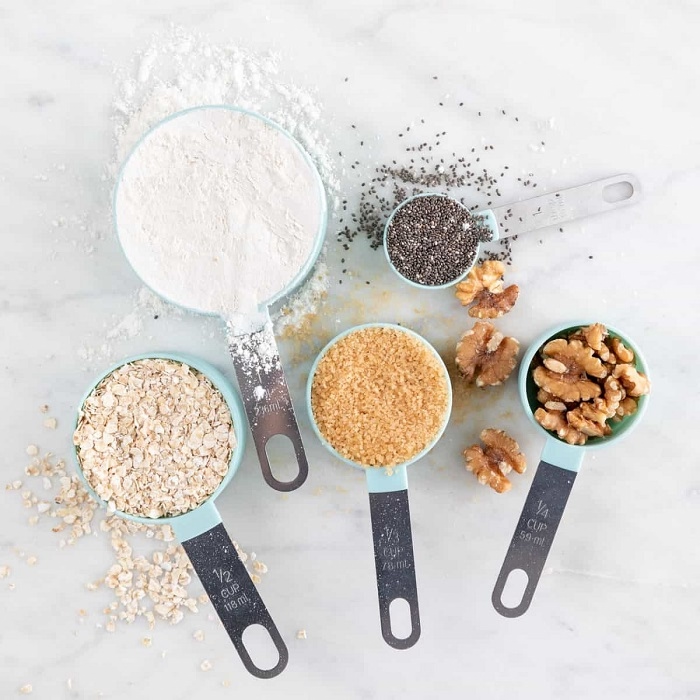1 cup = 16 tablespoons. Simple, right? But the deeper you go, the more you realize, measurements aren’t always straightforward. Different ingredients, different densities, different results. Let’s break it all down so you never have to second-guess a recipe again.
Table of Contents
Why Accurate Measurements Matter
Ever followed a recipe exactly and still ended up with a disaster? Maybe your cookies were too dry. Your cake didn’t rise. Your sauce turned out too thick. It’s frustrating. But often, the problem isn’t the recipe, it’s the measurement.
For liquids, measuring is easy. 1 cup of water is always 16 tablespoons. But dry ingredients? That’s where things get tricky. A cup of flour and a cup of sugar weigh completely different amounts. That’s why understanding the difference between volume and weight matters.
Standard Conversion Chart

For most recipes, the standard conversion is:
- 1 cup = 16 tablespoons
- 3/4 cup = 12 tablespoons
- 2/3 cup = 10 tablespoons + 2 teaspoons
- 1/2 cup = 8 tablespoons
- 1/3 cup = 5 tablespoons + 1 teaspoon
- 1/4 cup = 4 tablespoons
- 1/8 cup = 2 tablespoons
Super useful, right? But let’s take it further.
Dry vs. Liquid Ingredients
Not all cups are created equal. A cup of liquid always equals 16 tablespoons. But a cup of flour? That depends on how you measure it. If you scoop flour straight from the bag, you’ll pack it down and end up with more than 16 tablespoons. If you spoon it in lightly, you’ll have closer to the correct amount.
Here’s how to measure correctly:
- Dry ingredients: Spoon into the measuring cup, then level off with a knife. Don’t shake or press it down.
- Liquid ingredients: Use a liquid measuring cup with a spout and check at eye level.
Common Ingredient Conversions
Different ingredients take up different amounts of space. Here’s a quick guide:
Baking Staples
- 1 cup all-purpose flour = 16 tablespoons (but varies based on how it’s packed)
- 1 cup sugar = 16 tablespoons
- 1 cup brown sugar (packed) = 16 tablespoons
- 1 cup powdered sugar = 16 tablespoons (loosely packed)
- 1 cup cocoa powder = 16 tablespoons
Liquids
- 1 cup water = 16 tablespoons
- 1 cup milk = 16 tablespoons
- 1 cup heavy cream = 16 tablespoons
- 1 cup vegetable oil = 16 tablespoons
- 1 cup honey = 16 tablespoons (but super thick, so weigh it if needed)
Fats & Dairy
- 1 cup butter = 16 tablespoons (or 2 sticks)
- 1/2 cup butter = 8 tablespoons (1 stick)
- 1 cup margarine = 16 tablespoons
- 1 cup sour cream = 16 tablespoons
- 1 cup yogurt = 16 tablespoons
Miscellaneous
- 1 cup peanut butter = 16 tablespoons (but sticky, so scoop carefully)
- 1 cup oats = 16 tablespoons
- 1 cup breadcrumbs = 16 tablespoons (but density varies by type)
The Science Behind It
You might be wondering—why does this even matter? Well, precise measurements ensure your food turns out just right. Baking is chemistry. If you use too much flour, your cake will be dense. If you use too little sugar, your cookies won’t caramelize properly.
Even when cooking, measuring correctly can help balance flavors. Too much salt or too little oil can throw off a dish. So while a pinch of this and a splash of that works sometimes, measuring accurately makes a huge difference.
Pro Tips for Measuring
Want to get even better at kitchen conversions? Here are some expert tricks:
- Always fluff, scoop, and level dry ingredients. Packed flour = too much flour = dense baked goods.
- Use a scale for ultimate accuracy. 1 cup of flour should weigh about 120 grams (4.25 ounces), while 1 cup of sugar weighs 200 grams (7 ounces).
- When measuring sticky ingredients (like honey), coat your spoon with oil first. This helps it slide out easily.
- Know your measuring tools. Liquid measuring cups are different from dry measuring cups. Use the right one!
FAQs
Can I use teaspoons instead of tablespoons?
Yes! If you need to convert further:
- 1 tablespoon = 3 teaspoons
- 1 cup = 48 teaspoons
How do I measure butter without a measuring spoon?
Check the wrapper. Most sticks of butter have tablespoon markings right on them. If not, just remember:
- 1 stick = 1/2 cup = 8 tablespoons
Can I use grams instead of tablespoons?
Yes! Some common weight conversions:
- 1 cup flour = 120g
- 1 cup sugar = 200g
- 1 cup butter = 227g
- 1 cup honey = 340g
Do all liquids weigh the same?
Nope. 1 cup of water = 236 grams, but 1 cup of oil = 218 grams. Always check if precision matters in your recipe.
1 cup = 16 tablespoons. Easy enough. But understanding measurements beyond that? That’s what takes your cooking and baking to the next level. Get it right, and every dish comes out just the way you want. No more guesswork. Just perfect food, every time.

